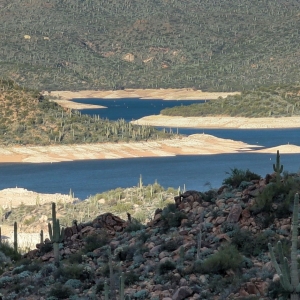Transcript
Welcome to “What’s Up With Water,” your need-to-know news of the world’s water from Circle of Blue. I’m Eileen Wray-McCann.
In Thailand, the government cancelled a dredging and blasting project that would have straightened a rocky stretch of the Mekong River to accommodate large cargo ships. According to VOA News, environmental advocates and researchers are hailing the decision as a rare victory for a Mekong ecosystem that is under constant threat of development. The dredging project was proposed by Beijing and endorsed by Laos, Myanmar, and Thailand in 2000, but local communities have been against it. Opponents feared that destroying the section of rapids to allow for cargo ship passage would damage critical habitat for the Mekong giant catfish and threaten livelihoods for people along the river.
In the United States, landmark legislation passed a half century ago to protect the country’s rivers has failed to achieve its ambitious goals. A report from the research group the Environmental Integrity Project found that half of U.S. river and stream miles are classified as “impaired.” An “impaired” water body has more pollutants than it should. The report said that 55 percent of lakes, ponds and reservoirs are impaired and that 25 percent of bays, estuaries, and harbors are impaired. The report marks the 50th anniversary of the Clean Water Act, a bedrock piece of environmental legislation. According to the report, the Clean Water Act has, thus far, failed to meet its goal of U.S. waters that are fishable and swimmable.
The primary polluters of rivers are industry, agriculture, and urban development. A recent incident in Illinois illustrates those threats. Last week, the Illinois attorney general filed a lawsuit against Marathon Pipeline LLC for a pipeline leak that happened earlier this month. The leak spilled 165,000 gallons of oil into waterways. The lawsuit seeks compensation from the company for violating state environmental laws. Oil from the spill entered Cahokia Creek, a tributary of the Mississippi River. The incident occurred in the southern part of Illinois near the city of Edwardsville, where Marathon operates a 75-mile pipeline. The spill was one of hundreds in the region in the last two decades, according to the St. Louis Post-Dispatch. Most of the previous spills were attributed to operator failures or inadequate pipeline maintenance. The cause of the Marathon spill, the focus of the Illinois lawsuit, is still being investigated.
And that’s “What’s Up With Water,” from Circle of Blue, where water speaks. More water news and analysis await you at circleofblue.org. This is Eileen Wray-McCann – thanks for being here.
Eileen Wray-McCann is a writer, director and narrator who co-founded Circle of Blue. During her 13 years at Interlochen Public Radio, a National Public Radio affiliate in Northern Michigan, Eileen produced and hosted regional and national programming. She’s won Telly Awards for her scriptwriting and documentary work, and her work with Circle of Blue follows many years of independent multimedia journalistic projects and a life-long love of the Great Lakes. She holds a BA and MA radio and television from the University of Detroit. Eileen is currently moonlighting as an audio archivist and enjoys traveling through time via sound.





